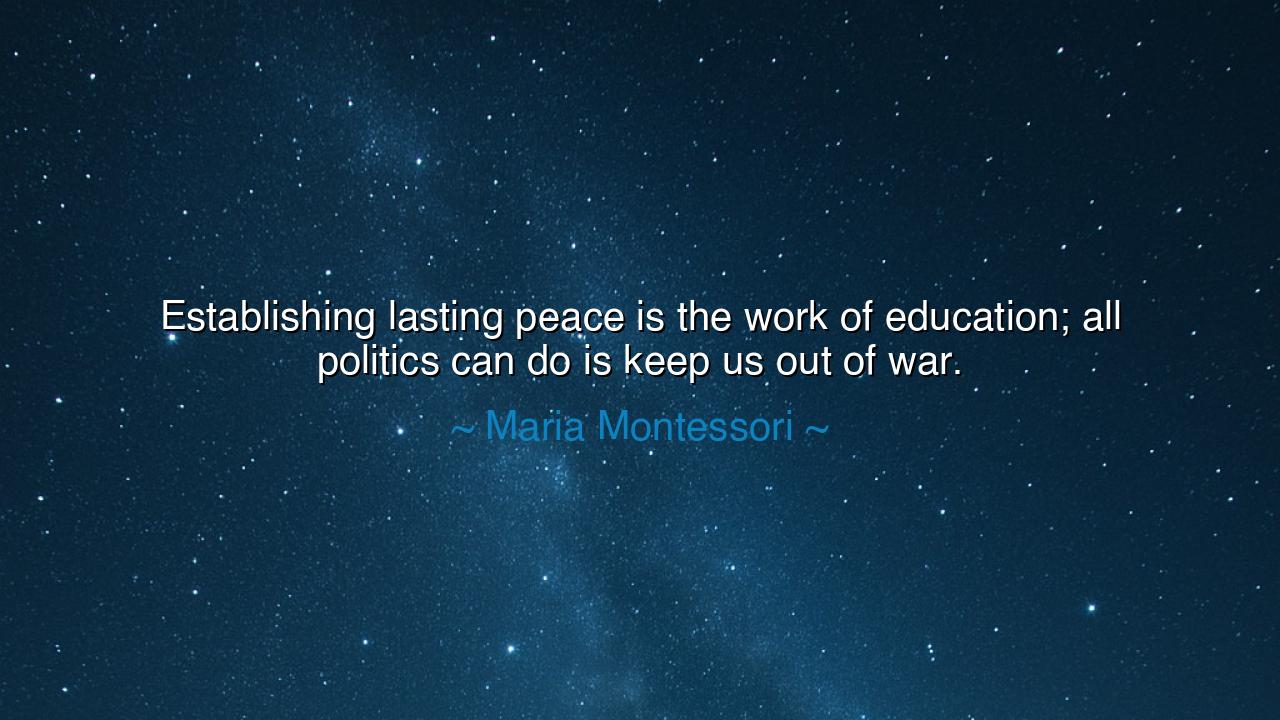
Establishing lasting peace is the work of education; all politics
Establishing lasting peace is the work of education; all politics can do is keep us out of war.






The words of Maria Montessori are a hymn to the eternal power of the human spirit. “Establishing lasting peace is the work of education; all politics can do is keep us out of war.” In this declaration lies a truth as old as civilization itself — that true peace cannot be legislated or forced into being; it must be taught, nurtured, and lived. Politics may sign treaties, armies may cease fire, but the hearts of men remain restless until they are schooled in understanding, compassion, and reason. Montessori, a pioneer of the modern mind, saw what emperors and generals could not: that the classroom, not the battlefield, is where the destiny of humanity is decided.
In the ancient world, sages like Confucius spoke of order through virtue, not decree. He taught that the harmony of a nation begins with the harmony of the family, and the harmony of the family begins with the cultivation of the heart. Likewise, Montessori, standing in the shadow of two world wars, saw that peace built on treaties was fragile — but peace built on education was eternal. She looked into the eyes of children and saw the future of nations; she understood that if hatred is learned, so too can kindness be taught. The child, she believed, is the seed of peace, and the teacher is its gardener.
History gives us countless proofs of her wisdom. After the devastation of the Second World War, nations divided by bloodshed turned to education to heal their wounds. Japan, once a land of militarism, transformed itself through a culture of learning, discipline, and innovation. Germany, shattered and shamed, rebuilt not by arms, but by teachers who restored faith in democracy and human dignity. Where politics failed to unite, education sowed understanding. Where power collapsed, the pen and the lesson plan quietly rebuilt civilization. In this way, Montessori’s vision transcended her time — she saw that peace is not the silence of guns, but the awakening of minds.
For politics, as she said, can only keep us out of war — it can restrain violence, but not abolish it. Laws can command obedience, but not compassion. Diplomacy can build borders, but not brotherhood. Only education can reach the unseen places where prejudice and fear are born. Only through teaching can we replace ignorance with empathy, and vengeance with wisdom. The sword may force surrender, but the book awakens the soul.
Montessori’s own life was a testament to this philosophy. During the rise of fascism in Italy, she refused to let her schools become instruments of propaganda. She fled into exile, carrying her message across the world: that peace must begin with the child. In India, she found a spiritual home, teaching that the first step toward world peace is teaching a child to respect life — every life. Her method, built on self-discipline and discovery, was not just a system of learning, but a philosophy of living. It was a quiet revolution against the machinery of hate.
The ancients would have called her a builder of souls. She saw education not as the filling of minds, but as the shaping of conscience. For in every classroom sits the next leader, the next soldier, the next citizen. What they are taught determines whether they will destroy or rebuild the world. To teach arithmetic without ethics, to cultivate intelligence without compassion, is to craft a sword without a sheath. But to teach the young that all humans are one family under heaven — that is to forge the very armor of peace.
Therefore, let us remember the wisdom of Maria Montessori: that peace begins not in parliaments, but in the hands of teachers. Every lesson of kindness is a stone laid in the foundation of a lasting civilization. Every child who learns respect, patience, and wonder becomes a guardian of harmony. Politics may guard the gates of war, but education builds the city of peace within.
Let each of us, then, become teachers in spirit. Let us teach not through words alone, but through conduct, through gentleness, through justice. For peace is not a policy — it is a practice. And if we would end the wars of tomorrow, we must begin today, in the hearts of our children, the great and eternal work of education.






AAdministratorAdministrator
Welcome, honored guests. Please leave a comment, we will respond soon